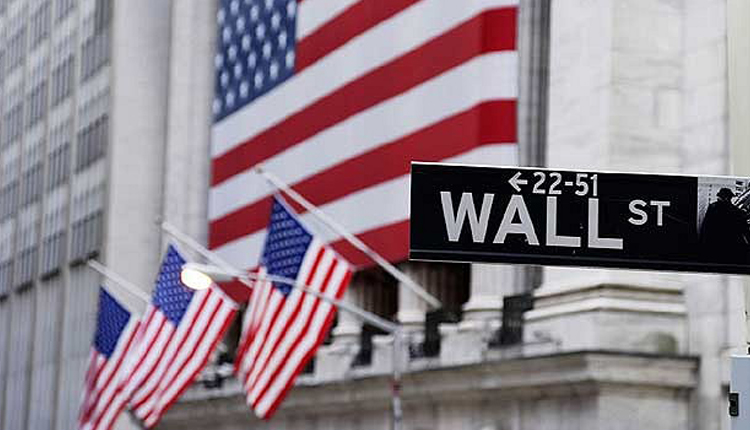Wall Street closed slightly higher Wednesday, paring earlier losses, after the Federal Reserve said it would be comfortable letting inflation temporarily run above its inflation target, according to CNBC.
The Dow Jones industrial average added 52.4 points to close at 24,886.81, led higher by gains in Boeing and McDonald’s. The S&P 500 rose 0.3 percent to finish at 2,733.29 after a decline in interest rates sparked strong performance from utilities and real estate. The Nasdaq composite added 0.6 percent to finish at 7,425.96 as Apple, Amazon, Facebook and Netflix led technology stock higher.
Fed officials said that they’d be comfortable allowing inflation to briefly run above its target as the economy continues to rebound, according to the central bank’s May meeting minutes.
Specifically, the minutes said “a temporary period of inflation modestly above 2 percent would be consistent with the Committee’s symmetric inflation objective.”
Though the general tone was that inflation would continue to rise, there was disagreement over how confident the Fed should be after undershooting its target for so long, with some members amenable to letting the prices climb higher.
“The market was bracing for a hawkish tone to the meeting minutes and what they got was symmetric and balanced in terms of the language,” said Michael Arone, chief investment strategist for State Street Global Advisors. “Stocks reacted well. Traditional defensive sectors, ones that have been negatively impacted by higher rates, are those that are leading the market today.”
The Dow started the day down more than 100 points after retail giant Target reported earnings that missed expectations while trade talks with China remained uncertain after President Donald Trump said the current dealmaking may be “too hard to get done.”
Uncertainty over the future of trade agreements between the United States and China has kept stocks on edge over the past two days. The president downplayed expectations for a deal Wednesday, suggesting a new direction for talks between the world’s economic powerhouses.
“It’s basically removing what we were given on Monday: that the enthusiasm that the Sino-American relationship was healing by the way of the U.S. and China agreeing on some format to solve the trade dispute,” said Mark Luschini, chief investment strategist at Janney Montgomery Scott.
Shares of industrial conglomerate General Electric fell 7.2 percent Wednesday, its worst one-day performance since 2009, after chief executive John Flannery said he expects no profit growth this year in its already stagnant power business.
Flannery declined to comment about whether the company would cut the company’s dividend again in 2019.
“We have to see how this plays out,” Flannery said to analysts at the annual Electrical Products Group conference in Florida, according to Reuters.
Globally, the Stoxx Europe 600 fell 1 percent while Japan’s Nikkei 225 fell 1.18 percent, its largest one-day decline since March.
The reversal in stocks was accompanied by purchases of safe haven assets like bonds. The yield on the benchmark 10-year Treasury note, which moves inversely with its price, fell to 3.008 percent. The dollar index, which tracks the dollar against a basket of other currencies, was up 0.5 percent at 94.11.
“To me, the takeaway is that the Fed is getting us comfortable with the fact that their forecast could be above 2 percent,” said Michael Materasso, co-chair of Franklin Templeton’s fixed-income policy committee. “It goes to show you that this 2 percent line in the sand should not be a line in the sand, but should be more of a range.”
Shares of Minneapolis-based Target sank more than 5.5 percent on Wednesday after it reported first-quarter earnings that missed analysts’ expectations on both the top and bottom lines.
The company blamed poor spring weather for the disappointing performance as it works to remodel many of its locations.
“Those numbers were below expectations,” said Dana Telsey, Telsey Advisory Group CEO. “The number of transactions accelerated from the fourth quarter, but with inventories being where they are, they had to mark down some goods … They’ve got some ground to make up.”
Home improvement retailer Lowe’s also missed expectations for the first quarter, reporting a rise in sales of just 0.6 percent versus expectations of a 3 percent increase, according to Reuters.
Its stock, however, rose more than 10 percent after it maintained its annual financial targets and famed hedge fund manager Bill Ackman revealed a $1 billion stake in the company.
High-end jeweler Tiffany & Co., meanwhile, easily beat analysts’ estimates. The company’s stock rose more than 23 percent after reporting earning per share of $1.14 versus expectations of 83 cents. It also raised its full-year guidance in light of the solid beat.
The New York-based company suggested its comeback plan is working to retain price-conscious millennial shoppers from drifting to new competitors.
“Those comps are much better than expected … Tiffany is getting new merchandise in their stores,” Telsey added. “It’s product, it’s marketing, it’s new engagement and I think that’s what the new management team is bringing.”
